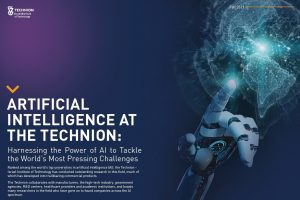Why are autonomous cars afraid of flying plastic bags?
The Technion held a conference on artificial intelligence and its applications in the real world, with the participation of leading experts from the Technion and industry
The Technion recently held a conference titled “AI: From Hype to Productivity,” at the Elma Hotel in Zichron Yaacov. The 350 attendees included leading figures from the Technion, local AI industry, and the governmental sector.
Technion President Professor Uri Sivan said at the opening of the event: “We have recently finished formulating the Technion’s strategic plan for the coming decade. One of the main pillars of the program is the Technion’s academic-industrial relations coupled with the need to adapt to the changes this axis implies. Nowadays, the traditional line between academia conducting basic research and industry focused on development no longer exists; the current ecosystem is brand new, so academia as a whole, and technological universities in particular, must adapt to this new reality. In the coming years, relations between academia and industry will become even stronger, and whilst this isn’t something new, it is expected to intensify. This changing relationship will include Artificial Intelligence – one of the “hottest” topics today positioned at the forefront of research. This forms the backdrop to this conference, which brings together research personnel from the Technion and industry to create a cooperation essential for both sides. For me, this is an opportunity to take pride in the many achievements of the AI community at the Technion.”
The conference was led by Professors Assaf Schuster and Shie Mannor, who co-lead the MLIS – Machine Learning and Intelligent Systems Center at the Technion. Prof. Mannor’s lecture dealt with Reinforcement Learning (RL) and its limitations. As he explained: “In this area, there have been impressive successes mainly in the field of games, with computers gaining victory over expert humans in backgammon (as early as 1992), as well as in checkers, chess, and Go. While this is a significant success, and the victory of Alpha-Go is one of the great achievements of AI, one must understand that there is a big leap between successes in this field and successes in other fields such as autonomous driving. Unfortunately, many researchers and companies are sugar-coating reality, making promises without real scientific basis. And at the end of the day, it’s a game. So why haven’t we yet solved the challenge of self-driving vehicles or even managing traffic jams at big roundabouts? The answer is that some things are very difficult to identify by computerized means. By way of example, a human driver, with all his limitations, knows how to recognize a pedestrian, and understands that if a plastic bag flies in front of the car there is no reason to swerve into the nearby lane to avoid it; computers still don’t know how to make these distinctions. I’m not saying these missions aren’t possible. I’m just saying we’re still a long way off. In fact, we’re just scratching the surface.”
Prof. Assaf Schuster’s lecture dealt with Stream Mining – monitoring huge data flows in real time. Tens of thousands of events are sometimes created during these processes and the technological challenge is to analyze them quickly, reliably, and automatically.
The conference lectures dealt with a wide range of topics, including the Interface Between Computational Learning and the Human User (Dr. Nir Rosenfeld, Henry and Marilyn Taub Faculty of Computer Science), the Importance of the Deep Learning Revolution in Image Denoising (Prof. Michael Elad, Taub Faculty of Computer Science), the Robotics Revolution that is Still Waiting to Happen (Dr. Aviv Tamar, the Andrew and Erna Viterbi Faculty of Electrical and Computer Engineering), Learning/Creating Images from a Single Example (Prof. Tomer Michaeli, Viterbi Faculty of Electrical and Computer Engineering), the Gap Between the Human Brain and AI Models when Dealing with Challenges Such as Vision and Speech Recognition (Prof. Daniel Soudry, Viterbi Faculty of Electrical and Computer Engineering), How to Explain Computer Systems in the Human-Behavioral Context (Prof. Ofra Amir, Faculty of Industrial Engineering and Management), Selective Focus within Artificial Intelligence Systems (Prof. Tamir Hazan, Faculty of Industrial Engineering and Management), and The Role of Urban Analytics in Planning and Policy (Prof. Pnina Plaut, Faculty of Architecture and Town Planning). Prof. Orit Hazzan of the Faculty of Science and Technology Education spoke about the Use of Data for Regulation and Planning in the K-12 Educational System.
The conference was created by three Technion bodies: MLIS, the Center for Machine Learning and Intelligent Systems, TCE – the Technion Center for Computer Engineering, and TDSI – the Technion Data Science Institute. The conference was moderated by Professor Lihi Manor-Zelnik of the Viterbi Faculty of Electrical and Computer Engineering.
For a video from the conference click here
To read our latest AI Brochure, click here.



